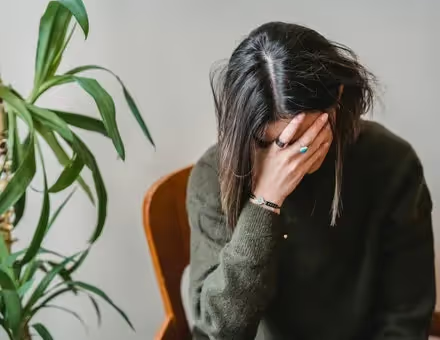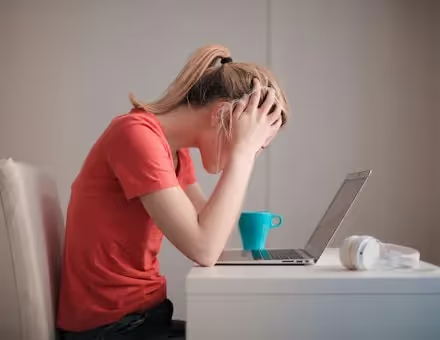One of the many questions we often ask ourselves is "how many calories does anxiety burn?"The answer to this question is: it depends on the type of anxiety...

One of the many questions we often ask ourselves is "how many calories does anxiety burn?
"The answer to this question is: it depends on the type of anxiety you have, the severity of your anxiety, and how quickly your heart beats during your attacks.
According to the Anxiety Society, there are six types of anxiety disorders: generalized anxiety disorder (GAD), panic disorder (PD), social phobia (or social anxiety disorder), specific phobias, agoraphobia, and separation anxiety disorder.
Each type of anxiety has a different impact on the body; however, they all result in similar symptoms that cause you to lose weight such as difficulty sleeping or decreased appetite.
Anxiety attacks happen to one in every fifty people. This means about two percent of humans experience anxiety attacks once every while, on average.
So, if you're one of those asking the question how many calories does an anxiety attack burn?
Don't go away! We'll answer this question in this article.
We will be considering the cause of anxiety attacks, how many calories you can burn by having anxiety attacks, and how you can manage anxiety attacks.
An anxiety attack is a feeling of being very terrible. You start feeling a great fear of doom and freak out over anything or nothing at all. Sometimes, this comes with an increase in heartbeat rate, dizziness, and chest pains.
In extreme cases, victims of anxiety attacks feel that their death is near or they have a heart attack. In some other cases, you can get very weak and tired.
Victims of anxiety attacks sometimes get a headache and feel cold.
There are various symptoms associated with anxiety attacks and all of them will be listed later in this post.

This cannot be determined exactly.
There are many factors affecting how many calories you burn from anxiety attacks.
We will be talking about two important ones.
This is the top factor that determines how many calories you burn from activities carried out, including anxiety attacks.
What is the Basal Metabolic rate?
The basal metabolic rate of a human is the number of calories required by the human body for carrying out basic activities.
Some of these basic activities are protein synthesis, cell production, respiration, and some other basic processes.
The basic Metabolic rate can be estimated using the Harris-Benedict Equation.
How to Calculate Basal Metabolic Rate Using Harris-Benedict Equation
The Harris-Benedict equation for estimating basic metabolic rate is defined differently for males and females.
For Men, the Basic Metabolic Rate = 66 + (6.23 x weight) + (12.7 x height) - (6.8 x age)
And for women, the Basic Metabolic Rate = 65 + (4.35 x weight) + (4.7 x height) - (4.7 x age)
The weight must be in pounds, height in inches, and age in years for you to get it right.
The basic metabolic rate determines how many calories you can burn in anxiety attacks.
The severity of the anxiety attack determines how many calories you burn.
Some severe anxiety attacks can cause serious headaches, dizziness, and panic while some others come only with panic.
Check the symptoms of anxiety attacks below for more information on what anxiety attacks can cause.
Some anxiety attacks cause teary feelings making the victim cry or having temporary paralysis in the hands.
Hence, some symptoms are light while some are severe
The Duration of the Attack
The duration of an anxiety attack hugely affects how many calories you burn during anxiety attacks.
Some anxiety attacks last a few hours while some last very much less, or very much more.
An attack that lasts two hours causing chills and increased heart rate will burn more calories than one that lasts one hour with worse symptoms.
What are the symptoms of anxiety attacks?
You can estimate the number of calories you burn during an anxiety attack using this equation:
Duration x (MET x 3.5 x weight)/200
The duration should be in minutes while the weight must be in kg.
Symptoms of Anxiety Attacks
Here are some of the symptoms you may get while having an anxiety attack:

There are speculations that anxiety attacks may be transferred genetically, but most patients experience anxiety after being in certain situations.
Some people can still experience anxiety attacks without being involved in all these.
People who are struggling against drug addiction may also experience anxiety attacks.
Stress hormones are released during an anxiety attack because of the feeling of fear and danger.
The hormones adrenaline and cortisol are major hormones released while having an anxiety attack.
The adrenaline release is what causes sweating because you start experiencing an increase in blood pressure and heartbeat rate when adrenaline is released.
Cortisol is released when the body is very stressed.
This hormone makes you feel tired because it releases glucose from your body's reserves.
Frequently Asked Questions and Answers
Is it Possible to Cure Anxiety?
No.
Anxiety cannot be cured.
However, if efficiently managed it can stop being a problem at all.
Why are Anxiety Attacks Exhausting?
The major cause of being exhausted during anxiety attacks is the release of cortisone hormone.
During an anxiety attack, you may feel very energized and alert due to the release of your energy reserves by cortisone.
The aftereffect of this is that you get very tired after the symptoms disappear.
During anxiety attacks, your adrenaline level spikes, increasing alertness and energy while sharpening your reflexes, so your body is prepared to either fight or run.
However, once the perceived threat is gone and your symptoms have dissipated, you may be left feeling tired and even sore.
No.
Anxiety does not worsen with age.
However, middle-aged adults experience more anxiety attacks than people in any other age bracket.
Can Anxiety Last All Day?
Anxiety attacks last for some hours on average but on the extreme, attacks can last for days.
Anxiety can worsen your health if you already are unhealthy and can make you get sick physically.
Excessive anxiety leads to stress which can cause you physical illness.
How Frequently do Anxiety Attacks Happen?
Some anxiety patients experience attacks once a month or twice too many times in the same period.
Anxiety attacks can be huge problems if not very well managed.
This article helps you understand many things about an anxiety attack and answers questions such as:
How many calories does an anxiety attack burn?
What are the symptoms of an anxiety attack? and many more.
Kindly leave a comment if you find this article valuable.
Yes, Medicaid provides insurance coverage for therapy services specifically designed to help individuals struggling with anxiety, depression, and other mental health conditions.
It's important that you feel comfortable discussing personal matters with your therapist in order to open up and get more out of therapy sessions; therefore finding someone who meets certain criteria like experience level, expertise areas, and personality is key when selecting a therapist who can give meaningful feedback about how best handle issues related to anxiety or other mental health concerns.
Ignoring anxiety can exacerbate symptoms and make it more challenging to manage over time. This can result in a negative impact on your personal, professional, and social life, leading to feelings of isolation and even depression.
Other activities which have been found helpful in reducing both immediate feelings of anxiousness and long-term anxieties associated with chronic disorders include yoga, journaling, nature walks, art therapy, volunteering, and other low-stress activities. Additionally, developing a healthy lifestyle incorporating adequate sleep, physical activity, and nutritious meals can help reduce overall stress levels.
To reduce your anxiety, you can practice relaxation techniques such as deep breathing, progressive muscle relaxation, guided imagery, and mindfulness practices. Additionally, regular exercise has been found to be beneficial in managing stress and improving mental health.
The duration of anxiety counseling varies for each individual, depending on the severity of their anxiety and their progress in therapy. Our therapists will regularly assess your progress and adjust your treatment plan as needed.